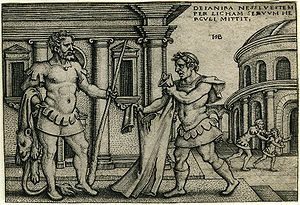
Lichas
Encyclopedia
In Greek mythology
, Lichas (icon) was Hercules
' servant, who brought the poisoned shirt
from Deianira
to Hercules because of her jealousy of Iole
, killing him. The story is recounted in Sophocles
’ Women of Trachis and Ovid
’s Metamorphoses.
 Cape Lichada is said to be where Hercules flung Lichas into the sea:
Cape Lichada is said to be where Hercules flung Lichas into the sea:
Greek mythology
Greek mythology is the body of myths and legends belonging to the ancient Greeks, concerning their gods and heroes, the nature of the world, and the origins and significance of their own cult and ritual practices. They were a part of religion in ancient Greece...
, Lichas (icon) was Hercules
Hercules
Hercules is the Roman name for Greek demigod Heracles, son of Zeus , and the mortal Alcmene...
' servant, who brought the poisoned shirt
The Shirt of Nessus
The Shirt of Nessus, Tunic of Nessus, Nessus-robe, or Nessus' shirt in Greek mythology was the poisoned shirt that killed Heracles. It was once a popular reference in literature...
from Deianira
Deianira
Deïanira or Dejanira is a figure in Greek mythology, best-known for being Heracles' third wife and, in the late Classical story, unwittingly killing him with the Shirt of Nessus...
to Hercules because of her jealousy of Iole
Iole
In Greek mythology, Iolë was the daughter of Eurytus, king of the city Oechalia. According to the brief epitome by the so-called Apollodorus, Eurytus had a beautiful young daughter named Iole who was eligible for marriage. Iole was claimed by Heracles for a bride, but Eurytus refused her hand in...
, killing him. The story is recounted in Sophocles
Sophocles
Sophocles is one of three ancient Greek tragedians whose plays have survived. His first plays were written later than those of Aeschylus, and earlier than or contemporary with those of Euripides...
’ Women of Trachis and Ovid
Ovid
Publius Ovidius Naso , known as Ovid in the English-speaking world, was a Roman poet who is best known as the author of the three major collections of erotic poetry: Heroides, Amores, and Ars Amatoria...
’s Metamorphoses.

So, in his frenzy, as he wandered there,
he chanced upon the trembling Lichas, crouched
in the close covert of a hollow rock.
Then in a savage fury he cried out,
“Was it you, Lichas, brought this fatal gift?
Shall you be called the author of my death?”
Lichas, in terror, groveled at his feet,
and begged for mercy--“Only let me live!”
But seizing on him, the crazed Hero whirled
him thrice and once again about his head,
and hurled him, shot as by a catapult,
into the waves of the Euboic Sea.
While he was hanging in the air, his form
was hardened; as, we know, rain drops may first
be frozen by the cold air, and then change
to snow, and as it falls through whirling winds
may press, so twisted, into round hailstones:
even so has ancient lore declared that when
strong arms hurled Lichas through the mountain air
through fear, his blood was curdled in his veins.
No moisture left in him, he was transformed
into a flint-rock. Even to this day,
a low crag rising from the waves is seen
out of the deep Euboean Sea, and holds
the certain outline of a human form,
so surely traced, the wary sailors fear
to tread upon it, thinking it has life,
and they have called it Lichas ever since.
- Ovid, Metamorphoses IX:211

